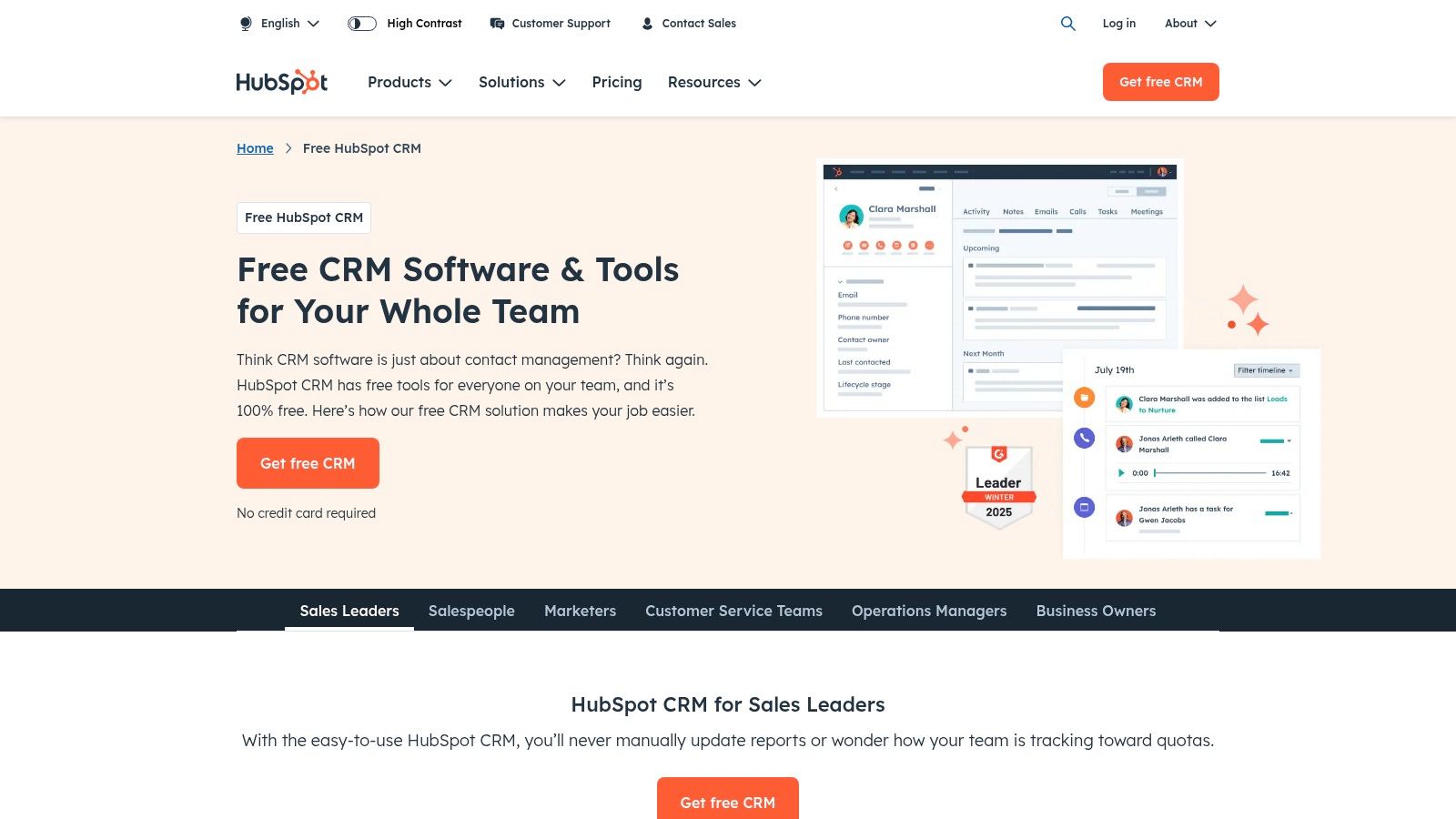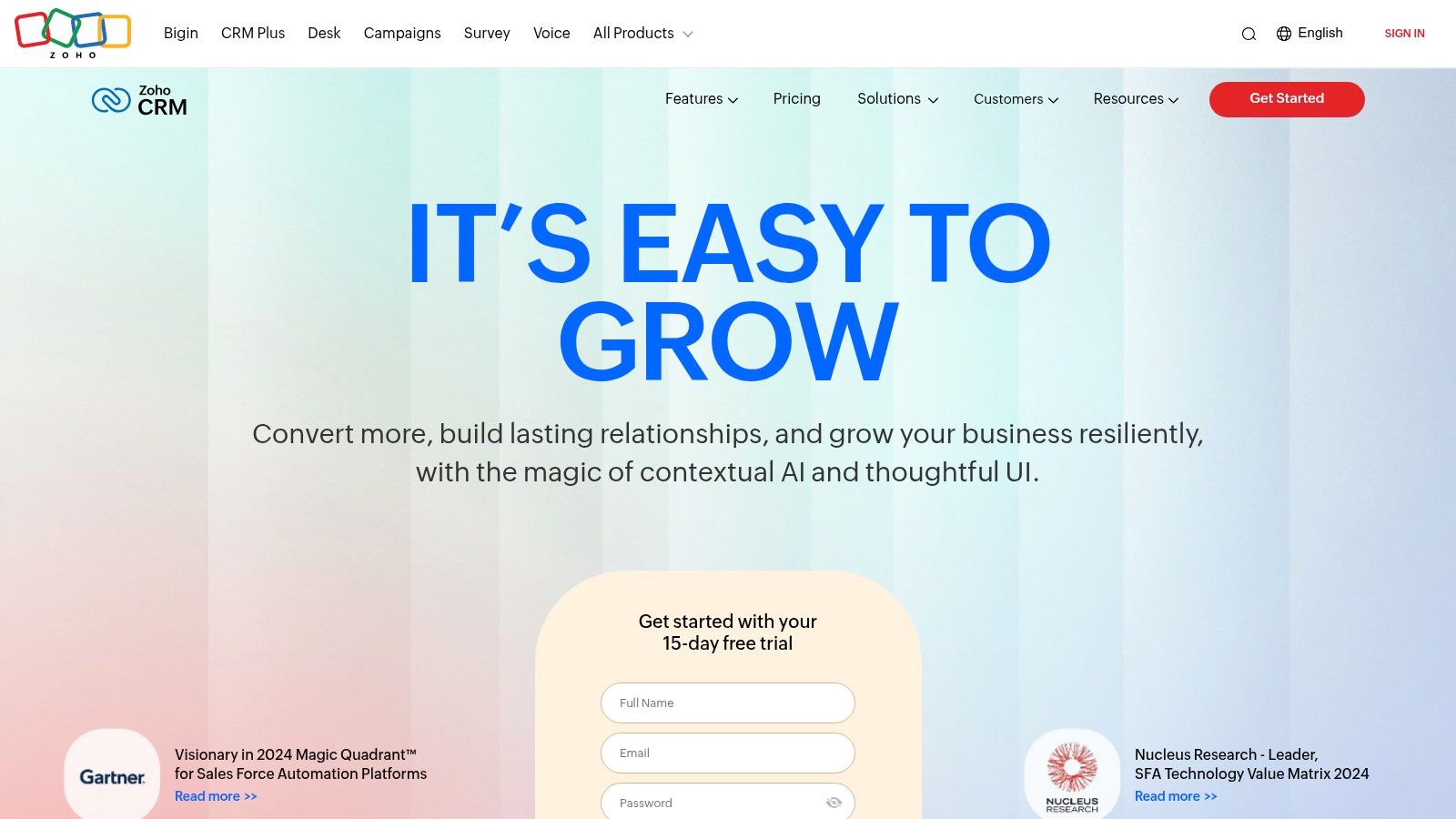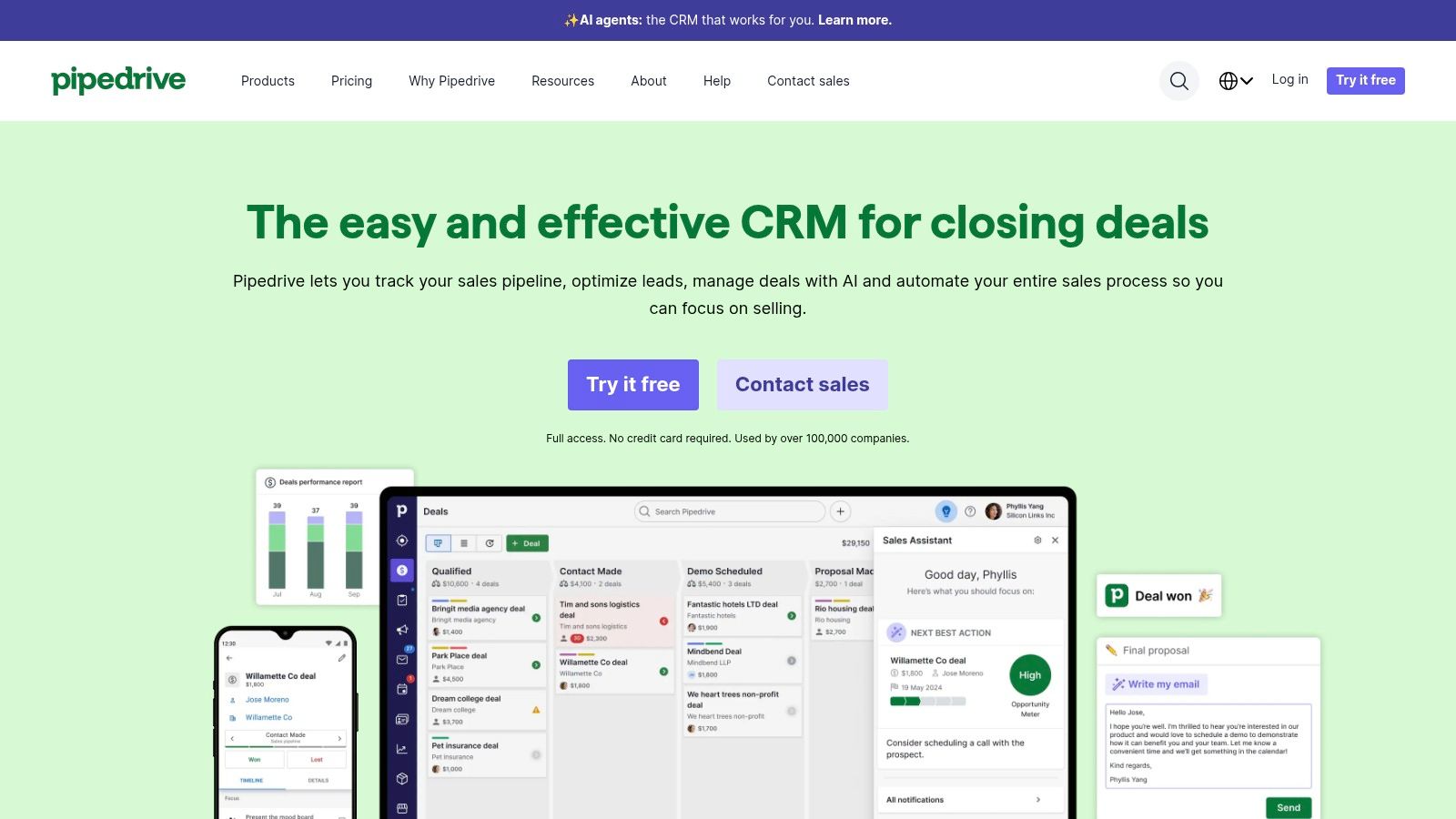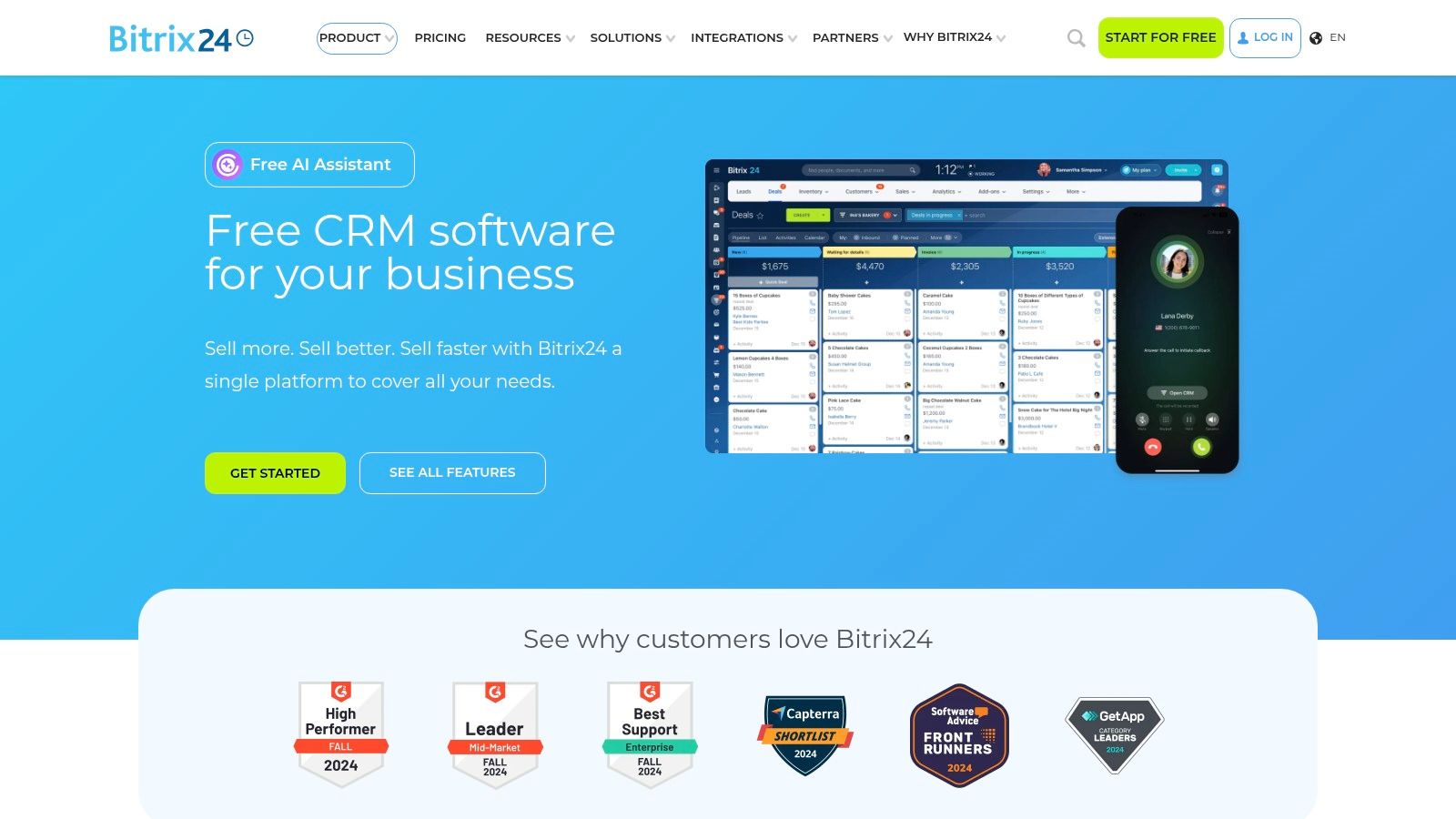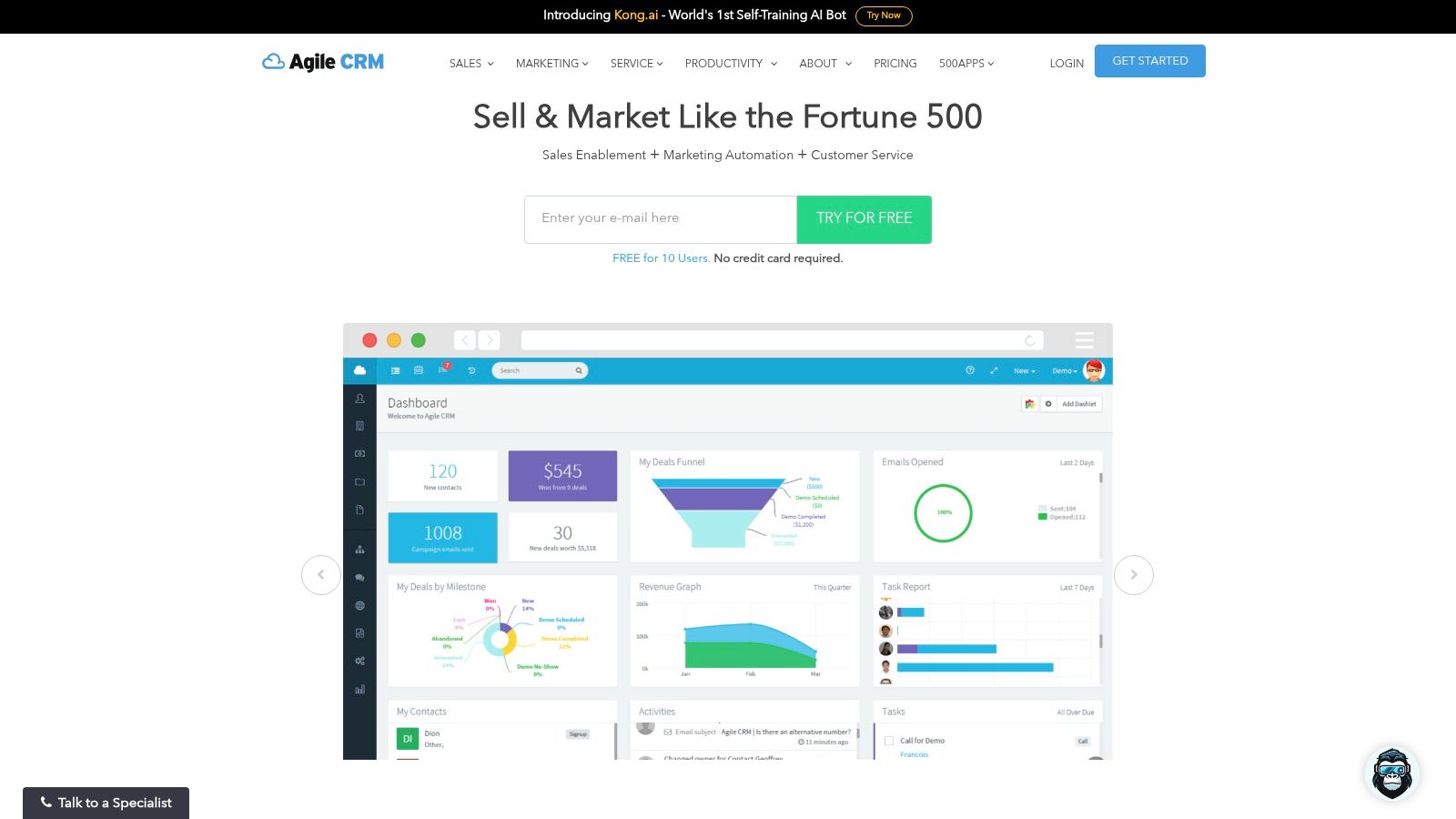Level Up Your Startup With the Right CRM
In the fast-paced startup environment, managing customer relationships effectively is crucial. A robust Customer Relationship Management (CRM) software solution can be essential for scaling your business. From organizing contacts and tracking interactions to automating sales processes, a good CRM provides valuable insights into customer behavior. However, the abundance of CRM solutions available can make choosing the right one for your startup feel daunting.
Do you need extensive sales automation, or will a simple contact management system suffice? What about pricing? Are you bootstrapping or venture-backed? How can you guarantee seamless integration with your existing technology?
Choosing an effective CRM means finding one that simplifies your workflow, not complicates it. Key features to consider include contact management, lead generation, sales pipeline tracking, marketing automation, reporting and analytics, and integrations with other platforms. The right CRM empowers you to nurture leads, personalize customer interactions, and ultimately, boost revenue growth.
Technical aspects like cloud vs. on-premise deployment, mobile accessibility, and user-friendliness are also essential, particularly for fast-moving startup teams.
Eight CRM Solutions for Startups in 2025
This list simplifies your decision-making process by showcasing eight top CRM software solutions specifically for startups in 2025. We’ll explore various options, from free and affordable CRM platforms for bootstrapped startups to more advanced solutions for rapidly scaling businesses.
- HubSpot: Offers a powerful free CRM with sales, marketing, and customer service tools.
- Zoho CRM: Cost-effective solution with sales force automation, email marketing, and support features.
- Salesforce: Industry-leading platform with extensive capabilities but can be pricey for smaller startups.
- Pipedrive: Focuses on sales pipeline management and visualization.
- Freshsales: Offers AI-powered insights and features for lead scoring and automated workflows.
- Insightly: Combines CRM and project management functionalities.
- Less Annoying CRM: Designed for small businesses with a simple and user-friendly interface.
- Streak CRM for Gmail: Integrates directly with Gmail, making it a convenient option for teams who rely heavily on email communication.
Whether you’re a tech enthusiast, business professional, digital marketer, remote worker, or part of the streaming and entertainment industry, you’ll find a CRM solution that fits your needs and budget. Discover the ideal tool to enhance your startup’s customer relationship management and drive growth.
1. HubSpot CRM
HubSpot CRM tops this list due to its generous free tier. This makes it an easy choice for startups needing to organize contacts, track deals, and nurture leads without significant upfront costs. This platform offers a suite of tools covering marketing, sales, customer service, and content management, all within a user-friendly interface.
For early-stage startups, HubSpot CRM’s free tier provides essential functions. These include contact and deal management with a visual pipeline, allowing you to easily visualize your sales progress. Email tracking and notifications ensure timely follow-ups, while meeting scheduling and live chat features simplify communication with potential customers. The free tier also integrates with Gmail and Outlook, streamlining your workflow. Basic reporting and analytics help you understand sales performance and identify areas for improvement.
As your startup expands, HubSpot CRM scales accordingly. Upgrading to paid plans unlocks advanced features like marketing automation, custom reporting, and sales forecasting. This flexibility makes HubSpot a valuable asset throughout your company’s growth.
Key Features
- Contact and deal management with visual pipeline
- Email tracking and notifications
- Meeting scheduling and live chat
- Free integration with Gmail and Outlook
- Basic reporting and analytics
Pros
- Generous free tier with essential CRM functionality
- Intuitive user interface with minimal learning curve
- Seamless integration with other HubSpot tools
- Excellent mobile app for on-the-go management
Cons
- Advanced features require paid upgrades
- Costs can increase with additional users and features
- Some users report limited customization options
- Reporting capabilities are basic in the free version
Practical Applications for Startups
- Lead Management: Capture leads, track interactions, and nurture them through your sales process.
- Sales Tracking: Monitor deal progress, identify bottlenecks, and forecast revenue.
- Customer Communication: Manage all customer interactions, from emails and calls to live chat.
- Marketing Automation: (Paid feature) Automate tasks like email marketing and social media posting.
Pricing
Free tier available. Paid plans start at $450/month.
Technical Requirements
Web-based application accessible from any modern browser. Mobile apps available for iOS and Android.
Comparison With Similar Tools
While tools like Zoho CRM and Freshsales offer free plans, HubSpot’s generous free tier and comprehensive marketing and sales tools make it a compelling choice for startups. Check out our sitemap for more resources on business tools.
Implementation Tip
Begin by importing existing contacts and setting up your sales pipeline. Utilize HubSpot’s knowledge base and free training resources to maximize the platform’s potential.
Website
https://www.hubspot.com/products/crm
2. Zoho CRM
Zoho CRM earns a place on this list thanks to its robust features and competitive pricing. This combination makes it particularly appealing for startups needing powerful CRM capabilities on a budget. The extensive customization options and integration with the broader Zoho ecosystem provide excellent scalability and flexibility for growing businesses.
Zoho CRM is a cloud-based customer relationship management platform built to help startups attract, retain, and satisfy customers. It offers a wide range of features, from managing basic contacts to advanced sales forecasting and automation. Imagine a streamlined sales process where leads are automatically captured from your website, nurtured with targeted email campaigns, and deals are tracked through a clear visual pipeline. Zoho CRM makes this a reality.
Key Features and Benefits
Here’s a breakdown of Zoho CRM’s key features and benefits:
-
Lead and Contact Management: Manage leads and contacts efficiently, track every interaction, and segment them for targeted campaigns. This is a valuable asset for digital marketers personalizing their outreach efforts.
-
Sales Forecasting and Pipeline Management: Visualize your sales pipeline, forecast revenue accurately, and identify potential roadblocks. This clear oversight is essential for business professionals involved in strategic decision-making.
-
Workflow Automation and Assignment Rules: Automate repetitive tasks such as lead assignments and follow-up emails. This automation frees up valuable time for your team to focus on higher-value work. It’s a significant productivity boost, especially for remote teams.
-
Multi-Channel Communication: Interact with customers across various channels—email, phone, and social media—all from within the CRM platform. This centralized approach is particularly helpful for businesses handling a high volume of customer interactions.
-
AI Assistant (Zia): Harness the power of AI with Zia for predictive sales, anomaly detection, and intelligent automation. Zia can pinpoint potential churn risks and prioritize high-value leads, providing a valuable competitive edge.
-
Integration with Zoho Ecosystem: Seamlessly integrate with other Zoho applications, including Zoho Books, Zoho Campaigns, and Zoho Desk, for a unified business management experience. This is a key benefit for businesses already within the Zoho ecosystem.
Pros and Cons of Zoho CRM
Here’s a quick summary of the advantages and disadvantages of using Zoho CRM:
Pros:
- Affordable Pricing: Starting at $14/user/month, Zoho CRM offers excellent value.
- Highly Customizable: Adapt the platform to your specific business needs and workflows.
- Broader Ecosystem: Benefit from a suite of integrated business tools within the Zoho ecosystem.
- Strong Mobile Capabilities: Ideal for sales teams on the move needing access to customer data.
Cons:
- Dated Interface: The user interface could benefit from a more modern look and feel.
- Learning Curve: Mastering all the features requires time and effort.
- Customer Support: Customer support response times could be improved.
- Advanced Features: Implementing some advanced features may necessitate technical expertise.
Implementation Tips for Zoho CRM
- Start with the Basics: Initially, focus on core features like contact management and lead tracking.
- Utilize Zoho’s Resources: Make the most of Zoho’s online tutorials and documentation.
- Consider Professional Help: For complex customizations or integrations, hiring a Zoho consultant might be beneficial.
Zoho CRM Compared to Others
When comparing Zoho CRM to solutions like Salesforce or HubSpot, Zoho offers a more budget-friendly option with comparable features, especially attractive for startups. While Salesforce might offer more enterprise-level functionality, Zoho CRM strikes a good balance between features and affordability, making it a good fit for smaller businesses.
Zoho CRM presents a powerful solution for startups seeking a comprehensive and affordable CRM platform. Its customization options, integrations within the Zoho ecosystem, and robust mobile capabilities make it a compelling choice. Businesses looking to streamline their sales processes and enhance customer relationships will find Zoho CRM a valuable tool. While there’s a learning curve involved, the potential benefits make the initial investment worthwhile.
3. Pipedrive
Pipedrive is a sales-focused CRM designed with simplicity and usability in mind. Built by salespeople, for salespeople, it’s particularly effective for startups establishing and optimizing their sales processes. Its visual pipeline interface makes deal tracking and action prioritization intuitive, helping startups stay laser-focused on closing deals. This focus makes it a strong contender among top CRM software for startups.
Pipedrive’s core strength lies in its visual sales pipeline management. Deals are represented as cards you can drag and drop across different stages of your sales process. This provides a clear overview of your sales activities and helps identify bottlenecks. Customizable deal stages and fields allow you to tailor the pipeline to your specific sales methodology.
Integrated email tracking and templates streamline communication. Sales forecasting and reporting tools provide valuable insights into your sales performance. Mobile apps with offline functionality further enhance flexibility for teams on the go.
For a startup, implementing Pipedrive can be quick and easy. The intuitive interface requires minimal configuration, allowing your sales team to get up and running rapidly. You can start with a basic pipeline and gradually customize it as your business grows and evolves. You might be interested in: Our Sitemap for more resources.
Features:
- Visual sales pipeline management
- Customizable deal stages and fields
- Email integration with tracking and templates
- Sales forecasting and reporting
- Mobile apps with offline functionality
Pros:
- Intuitive, visually-oriented interface
- Quick setup process with minimal configuration
- Strong focus on sales process and methodology
- Regular product updates and improvements
Cons:
- Limited marketing automation capabilities
- Not as feature-rich as some competitors for non-sales functions (e.g., marketing automation, customer support)
- Can become costly as team size increases
- Some users report occasional performance issues
While Pipedrive excels at sales management, it’s important to acknowledge its limitations. If you require extensive marketing automation features or robust functionalities beyond sales, you might consider other CRM platforms. Alternatives like HubSpot or Salesforce offer more comprehensive solutions but often come with a steeper learning curve and higher price tag. Pipedrive shines when your primary focus is streamlining your sales process and closing deals efficiently, making it ideal for sales-driven startups.
Pricing:
Pipedrive offers various pricing plans based on features and the number of users. It’s advisable to visit their website for the most up-to-date pricing information.
Technical Requirements:
Pipedrive is a cloud-based solution accessible through a web browser. Mobile apps are available for iOS and Android devices.
Website:
4. Freshsales
Freshsales, a part of the Freshworks ecosystem, is a compelling CRM solution designed for high-growth startups. Its strength lies in combining sales, marketing, and customer service functionalities into a single platform. This streamlines operations and encourages team collaboration, making it a powerful tool for managing all customer interactions from one central hub.
One of Freshsales’ key advantages is its AI-powered lead scoring. This feature analyzes lead behavior and attributes to predict the likelihood of conversion. This allows startups to prioritize high-potential leads and optimize sales efforts. Imagine a virtual assistant pre-qualifying your leads so your sales team can focus on closing deals, not dead ends. This is often a premium feature in other CRMs, but Freshsales offers robust AI capabilities, even in its more affordable plans.
Freshsales also boasts a clean, modern interface that simplifies user adoption. The intuitive visual sales pipeline, with its drag-and-drop functionality, provides a clear overview of your sales process. This makes it easy to track deals and identify any bottlenecks. Built-in phone, email, and chat capabilities further streamline communication and improve team efficiency.
Automation and Reporting
Automation features for repetitive tasks, like follow-up emails and appointment scheduling, free up valuable time for more strategic activities. Customizable reports and dashboards provide insightful data on sales performance, lead conversion rates, and other key metrics. This data empowers you to make informed, data-driven decisions.
Features:
- AI-powered lead scoring and contact management
- Built-in phone, email, and chat
- Visual sales pipeline with drag-and-drop interface
- Time-saving automation for repetitive tasks
- Customizable reports and dashboards
Pros:
- Modern, clean user interface for quick adoption
- A free tier is available for early-stage startups
- Strong AI capabilities, even in lower-tier plans
- Seamless integration with other Freshworks products
Cons:
- Limited third-party integrations compared to other CRM platforms
- Some advanced customizations may require technical expertise
- The mobile app lacks some desktop functionality
- Customer support consistency could be improved
Pricing: Freshsales offers a free plan for small teams, with paid plans starting at $15/user/month. Visit their website for specific pricing and features.
Implementation Tips:
- Start with the free plan to explore the platform.
- Use the available documentation and training resources.
- Integrate Freshsales with other tools for enhanced functionality.
- Customize the sales pipeline and reports to match your business processes.
Freshsales vs. HubSpot
While HubSpot is another popular CRM for startups, Freshsales is often a more budget-friendly option. This is especially true for those prioritizing AI-powered lead scoring and a user-friendly interface. However, HubSpot generally offers a wider range of third-party integrations.
Why Choose Freshsales?
Freshsales earns a spot on this list because of its powerful features, intuitive interface, and affordability. The platform’s focus on AI-powered lead scoring, combined with its comprehensive sales and marketing tools, makes it valuable for high-growth startups looking to maximize efficiency and accelerate sales.
Website: https://www.freshworks.com/crm/sales/
5. Monday Sales CRM
Monday Sales CRM offers a different approach to customer relationship management (CRM). Integrated within the monday.com Work OS, it presents a visual way to manage customer interactions. Its highly customizable design makes it attractive for startups needing a CRM that adapts to their growth. Rather than forcing your team to conform to rigid software, Monday Sales CRM molds itself to your specific sales processes. This adaptability is especially helpful for startups still refining their sales strategies and workflows.
Imagine a Kanban board, but designed for sales. That’s the essence of Monday Sales CRM. Visualize your entire sales pipeline, from lead qualification to closing deals, on customizable boards. The drag-and-drop feature simplifies moving deals through stages, assigning tasks, and monitoring progress.
Key Features and Benefits
-
Customizable Visual Boards and Workflows: Move beyond spreadsheets and embrace visual organization. Track deals, contacts, and activities on customizable boards that reflect your sales process.
-
Contact and Lead Management: Consolidate all your customer data in a single location. Easily segment leads, track communication history, and manage contact information.
-
Email Integration and Automation: Integrate with your current email platform (Gmail, Outlook, etc.) to automate follow-ups, personalize emails, and monitor email engagement directly within Monday.com.
-
Activity Tracking and Reminders: Stay on top of everything. Set reminders for follow-up calls, meetings, and other important activities. Track all client interactions to maintain a smooth customer experience.
-
Collaborative Environment: Enhance teamwork with integrated collaboration tools. Tag team members, share updates, and collaborate seamlessly on deals. This is particularly useful for startups with cross-functional teams involved in the customer journey.
Pros
-
Highly Visual Interface with Customizable Views: Quickly grasp your sales pipeline. Adjust views to individual needs and preferences.
-
Excellent Collaboration Features for Team Selling: Improved communication and transparency helps teams work together effectively.
-
Flexible Platform that Can Adapt to Various Use Cases: Monday.com isn’t just for sales; it also supports project management, marketing, and other business operations.
-
No-Code Automation Capabilities: Automate repetitive tasks without coding, freeing up your team to focus on closing deals.
Cons
-
Can be More Expensive than Traditional CRMs: The robust features and flexibility come at a cost. Startups with limited budgets should carefully evaluate the pricing plans.
-
May Require Significant Setup to Optimize for Sales Processes: While highly customizable, maximizing Monday Sales CRM’s potential might require an initial time investment for setup and configuration.
-
Learning Curve for Users Accustomed to Traditional CRMs: The visual interface might require some adjustment for users familiar with traditional list-based CRMs.
-
Some Sales-Specific Features are Less Developed than Specialized CRMs: While Monday Sales CRM offers numerous features, some specialized sales tools may provide more advanced functions in particular areas.
Pricing and Technical Requirements
Monday.com offers several pricing tiers based on user count and features. Visit their website for current pricing details. Monday Sales CRM is cloud-based and accessible through a web browser. Mobile apps are also available for iOS and Android devices.
Comparison with Similar Tools
Pipedrive and Salesforce provide more traditional CRM experiences. Monday Sales CRM differentiates itself with its visual approach and customization options. If your startup prioritizes visual project management and requires an adaptable CRM, Monday might be the right choice.
Implementation Tip
Begin with a simple board and gradually add complexity. Use pre-built templates to speed up setup and explore the automation features to streamline workflows.
Why Monday Sales CRM Stands Out
For startups, adaptability is essential. Monday Sales CRM delivers the flexibility to create a CRM that accurately reflects your evolving sales processes. Its visual interface and collaborative tools foster transparency and teamwork, making it a powerful asset for growing startups. While cost is a factor, the potential for improved efficiency and streamlined workflows can make it a valuable investment. Visit Monday Sales CRM
6. Bitrix24: The All-in-One Swiss Army Knife for Startups
Bitrix24 earns its spot on this list by offering a remarkable range of functionalities within a single platform. This is particularly attractive to startups watching their budgets. It combines CRM capabilities with project management, communication tools, and even HR functionalities, potentially eliminating the need for several separate subscriptions.
This consolidated approach simplifies workflows and centralizes valuable data, a significant advantage for any growing business. Imagine, for example, a startup launching a new marketing campaign.
With Bitrix24, the team can manage leads and customer contacts within the CRM, assign tasks and track progress using its project management tools, and communicate seamlessly through integrated chat and video conferencing. They can even store campaign assets in the document management system.
All of this happens within one platform, promoting better collaboration and eliminating the constant switching between different applications.
Key Features and Benefits
-
Contact and Lead Management: Visual pipelines offer a clear overview of the sales process, helping teams effectively nurture and convert leads.
-
Integrated Communications: Built-in chat, video calls, and email features streamline team communication and improve response times, which is especially valuable for remote teams or businesses with distributed workforces.
-
Task and Project Management: Manage projects, assign tasks, set deadlines, and monitor progress – all within the same platform as your CRM.
-
Document Management & Collaboration: Centralized storage allows for version control, easy access, and seamless collaboration on documents such as marketing materials, sales presentations, or legal agreements. All are accessible from within Bitrix24.
-
Website Builder & Forms: Streamline your marketing and lead generation by creating landing pages, contact forms, and even basic websites directly through Bitrix24.
Pros
- Extensive Free Plan: Supports up to 12 users with a good range of features, ideal for bootstrapped startups.
- All-in-One Platform: Consolidates multiple tools, reducing software costs and overall system complexity.
- Robust Feature Set: Offers features beyond the basics of CRM, addressing a wider spectrum of business needs.
- Flexible Deployment: Choose between cloud-based or self-hosted solutions, giving businesses maximum control and scalability.
Cons
- Cluttered Interface: The sheer number of features can initially feel overwhelming, especially for new users.
- Steeper Learning Curve: Mastering all of Bitrix24’s functionalities requires time and effort.
- Mobile App Limitations: While functional, the mobile apps lack the polish and full feature set of the desktop version.
- Integration Challenges: Some features, while present, may feel disconnected and lack truly seamless integration.
Pricing and Technical Requirements
Bitrix24 offers a free plan for up to 12 users. Paid plans begin at approximately $69/month for advanced features and increased user capacity. Check their website for the most current pricing. The cloud-based version only requires a web browser and an internet connection, while self-hosting demands appropriate server infrastructure and technical expertise.
Implementation Tips
- Begin with the core CRM features and gradually explore other functionalities.
- Use the available tutorials and documentation to learn the platform effectively.
- Customize the interface to highlight the most relevant tools, minimizing clutter.
Comparison
Bitrix24 shares similarities with platforms like Zoho and HubSpot but stands out with its generous free tier, broader feature set, and flexible deployment options.
Website: https://www.bitrix24.com/tools/crm/
Bitrix24 provides a powerful, if complex, solution for startups wanting a comprehensive business tool. Though the interface and learning curve may present initial challenges, its extensive free plan and wide-ranging features make it a strong contender for companies looking to streamline operations and consolidate their software needs.
7. ClickUp
ClickUp, widely known for its project management capabilities, has become a comprehensive platform with robust CRM features. This makes it an attractive option for startups needing a single solution to manage projects, tasks, and customer relationships. Its adaptable and customizable nature makes it especially suitable for the ever-changing demands of a growing business.
For startups juggling various tools and needing a clearer overview, ClickUp provides a central hub. Imagine managing marketing campaigns, tracking sales leads, and collaborating on content, all within one interface. This eliminates constant app switching and streamlines communication, ultimately boosting productivity.
Key Features For Startups
-
Custom CRM Views and Dashboards: Tailor your CRM to reflect your sales process and display key metrics using customizable dashboards. Track leads, opportunities, and customer interactions in a way that works best for your business.
-
Deal Tracking and Pipeline Management: Visualize your sales pipeline, monitor deal progress, and pinpoint potential bottlenecks. This feature allows for accurate sales forecasting and proactive issue resolution.
-
Task Assignment and Collaboration: Assign tasks, set deadlines, and work together with team members within the CRM. This fosters accountability and keeps everyone aligned.
-
Document Creation and Storage: Keep all sales-related documents organized – proposals, contracts, presentations, and meeting notes. Easy access to this information enables faster decision-making and better client communication.
-
Goal Tracking and Reporting: Define and track sales goals, monitor key performance indicators (KPIs), and create insightful reports to measure progress and identify improvement opportunities.
Pros
-
Generous Free Tier: ClickUp’s free tier offers a surprising number of features, making it accessible to budget-conscious startups.
-
Highly Customizable: Adapt ClickUp to your unique workflows and business processes. Its flexibility allows it to evolve alongside your needs.
-
Project Management & CRM Integration: Managing projects and customer relationships in a single platform simplifies workflows and enhances team communication.
-
Regular Feature Updates and Improvements: ClickUp continually evolves, adding new features to keep you equipped with the latest tools and functionalities.
Cons
-
Not a Dedicated CRM Solution: While ClickUp offers robust CRM features, it’s not its primary focus. It might lack some specialized sales tools found in dedicated CRM platforms like Salesforce.
-
Overwhelming Feature Set: The sheer number of options and customizations can initially overwhelm new users and demand some time to learn.
-
Occasional Performance Issues: Some users have reported occasional performance issues, particularly when dealing with large datasets.
Pricing and Technical Requirements
ClickUp offers a free forever plan. Paid plans start at $5 per user per month and offer additional features and storage. ClickUp is cloud-based and accessible via any modern web browser. Desktop and mobile apps are also available.
Comparison and Implementation Tip
While tools like Monday.com offer similar project management and CRM integration, ClickUp distinguishes itself with its higher level of customization and a more comprehensive free tier. Dedicated CRM solutions like Salesforce provide specialized sales functionalities but at a significantly higher cost.
When implementing ClickUp, begin with a basic setup concentrating on essential CRM features. Gradually explore and incorporate other features as your familiarity with the platform grows.
Why ClickUp Deserves Its Place
ClickUp’s blend of powerful project management, adaptable CRM functionalities, and a generous free tier makes it an excellent option for startups. It simplifies operations and supports growth effectively. Its customization allows it to scale with your business, adapting to changing needs without forcing a platform migration.
ClickUp CRM
8. Agile CRM
Agile CRM is a compelling all-in-one CRM solution designed for startups and small businesses. It seamlessly integrates sales, marketing, and customer service functionalities into a single platform. This eliminates the need for multiple software subscriptions and simplifies operations for resource-constrained startups.
This cost-effective approach lets businesses manage their entire customer lifecycle. From initial contact to ongoing support, Agile CRM helps manage customer interactions without excessive expense. This streamlined approach also fosters team collaboration and helps deliver a consistent customer experience.
Imagine your startup launching a new product. With Agile CRM, you can create targeted email campaigns. You can nurture leads, track deal progress, and provide customer support through an integrated helpdesk, all within a unified interface.
Key Features and Benefits of Agile CRM
Agile CRM offers a variety of features to meet different business needs:
- Contact Management and 360° Customer View: Gain a complete picture of each customer interaction. This gives you valuable insights for personalized communication and targeted marketing.
- Sales Automation and Deal Tracking: Automate repetitive sales tasks and track deals through different stages. This provides clear visibility into your sales pipeline.
- Marketing Automation with Email Campaigns: Design and automate email marketing campaigns. Segment your audience and track campaign performance.
- Helpdesk and Customer Service Tools: Offer efficient customer support using ticketing, a knowledge base, and other helpful tools.
- Customizable Forms and Landing Pages: Capture leads and collect customer information through customized forms and landing pages.
Pros and Cons of Agile CRM
Understanding the advantages and disadvantages of any platform is crucial before making a decision. Here’s a look at the pros and cons of Agile CRM:
Pros:
- Affordable Pricing: At $8.99/user/month, Agile CRM provides a competitive price for its features.
- Comprehensive Platform: It covers sales, marketing, and customer service, providing a complete customer journey solution.
- Free Plan Available: Startups can begin with a free plan for up to 10 users.
- Good Balance of Features and Usability: It balances robust functionality and ease of use.
Cons:
- User Interface: Some may find the interface less modern than competitors.
- Limited Customization: Advanced customization options may be restricted for complex needs.
- Occasional Reliability Issues: Some users have reported occasional problems with reliability.
- Customer Support: Customer support response times can sometimes be slow.
Pricing and Further Information
Agile CRM starts at $8.99/user/month. A free plan is available for up to 10 users. You can find more resources on our Sitemap.
Agile CRM is an excellent choice for startups needing an affordable, integrated CRM. While it may not have the polish or advanced customization of pricier competitors, its comprehensive features and cost-effectiveness make it valuable for growing businesses. Its all-in-one design simplifies operations, letting startups focus on building their business and satisfying customers. The free plan lowers the entry barrier, allowing even the smallest startups to use CRM. However, businesses requiring extensive customization or prioritizing a polished interface should consider these limitations. Visit Agile CRM.
Head-to-Head CRM Comparison: Top 8 Solutions for Startups
| CRM Tool | Core Features ★ | UX Quality 🏆 | Value 💰 | Target Audience 👥 | Unique Feature ✨ |
|---|---|---|---|---|---|
| HubSpot CRM | Visual pipeline, email tracking, live chat | Intuitive & mobile friendly ★ | Free starter; scalable upgrade | Startups | Seamless integration |
| Zoho CRM | Lead management, forecasting, automation | Highly customizable ★★ | Affordable from $14/user | Growing SMBs | Ecosystem integration |
| Pipedrive | Visual sales pipeline, deal tracking | Clean, sales-focused ★ | Easy setup; cost grows with team | Sales teams | Designed by salespeople |
| Freshsales | AI lead scoring, visual pipeline, inbuilt comms | Modern & clean ★ | Free tier available; strong AI | High-growth startups | AI-enabled insights |
| Monday Sales CRM | Custom visual boards, flexible workflows | Collaborative & visual ★ | Flexible but pricey | Cross-functional teams | No-code automation |
| Bitrix24 | All-in-one CRM with PM & comms, free for 12 users | Feature-rich but cluttered ★ | Extensive free plan | Multi-department businesses | Comprehensive toolset |
| ClickUp | Custom CRM views, deal tracking, task management | Highly customizable ★ | Generous free tier | All-in-one productivity | Combines PM and CRM |
| Agile CRM | Sales, marketing & service automation | Functional but less modern ★ | Affordable from $8.99/user; free plan | Small businesses & startups | All-in-one solution |
Choosing Your Perfect CRM Match
Selecting the right CRM is a crucial step for any startup. With so many options available, like HubSpot, Zoho, Pipedrive, Freshsales, Monday Sales CRM, Bitrix24, ClickUp, and Agile CRM, finding the perfect fit for your specific needs and budget is essential.
Guidance on Choosing
Before committing to a CRM, consider these key factors:
-
Sales Process Complexity: For simpler sales pipelines, Pipedrive or HubSpot’s free tier might be sufficient. However, if your sales process is more complex, the advanced features of Zoho or Freshsales could be a better fit.
-
Team Size and Collaboration: Smaller teams often find Monday Sales CRM or ClickUp intuitive and easy to use. Larger teams, on the other hand, might benefit from Bitrix24 and its built-in communication tools.
-
Marketing Automation Needs: If marketing automation is a core requirement for your startup, explore the robust features offered by HubSpot, Zoho, or Agile CRM.
-
Industry Specific Features: Some CRMs are tailored to specific industries. Take the time to research whether any platform aligns particularly well with your sector.
Implementation and Getting Started
Once you’ve selected a CRM, follow these steps for a smooth implementation:
-
Start Small: Begin by utilizing the essential features of your chosen CRM. Gradually expand usage as your team becomes more comfortable with the platform.
-
Data Migration: Carefully plan your data migration process. A meticulous approach will help prevent data loss and ensure a smooth transition.
-
Training: Invest in training for your team to maximize CRM adoption and overall effectiveness.
Budget and Resource Considerations
Understanding the financial implications of implementing a CRM is crucial:
-
Free Tiers vs. Paid Plans: Many CRMs offer free tiers with limited features. These are excellent options for startups with tight budgets. As your business grows, consider upgrading to a paid plan to access more advanced functionalities.
-
Hidden Costs: Be mindful of potential hidden costs. These might include add-ons, integrations, or premium support services.
-
Implementation Time and Resources: Factor in the time and resources required for implementation, training, and ongoing maintenance.
Integration and Compatibility
Integrating your CRM seamlessly with your existing tools is important for maximizing efficiency:
-
Existing Software Stack: Ensure your chosen CRM integrates seamlessly with your existing software, such as marketing automation platforms, email clients, and accounting software.
-
API Availability: A robust API is essential for custom integrations. It allows you to expand the CRM’s functionality and tailor it to your specific needs.
Key Takeaways
Here are some key takeaways to remember when choosing a CRM:
-
Define Your Needs: Clearly outline your startup’s specific requirements and goals before evaluating CRM options.
-
Prioritize User Experience: A user-friendly CRM encourages adoption and boosts team productivity.
-
Scalability: Choose a CRM that can scale with your business as it grows.
Conclusion
Choosing the right CRM is a significant investment in your startup’s future. By carefully considering your needs, budget, and long-term goals, you can select the perfect match. This empowers your team, strengthens customer relationships, and fuels your growth, not just in 2025, but for years to come. Take your time to evaluate your options and choose wisely.






